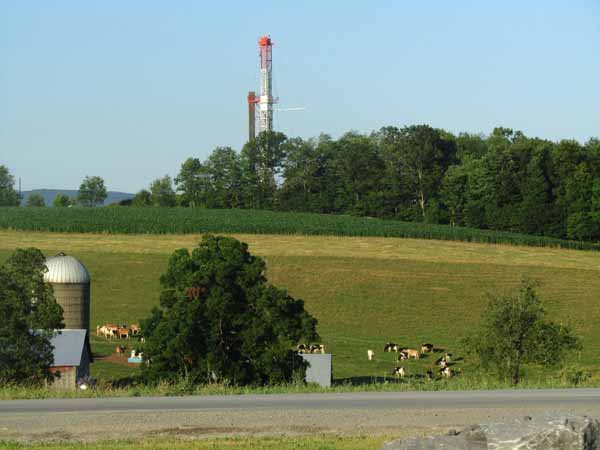Former environmental secretaries criticize bill changing DEP permitting
-
Marie Cusick

Kimberly Paynter / Newsworks
A tax code bill recently approved by the state senate would change how the permitting process works at the state Department of Environmental Protection.
Former Pennsylvania environmental secretaries say changes aimed at streamlining the Department of Environmental Protection’s permitting process would likely have the opposite effect and lead to lawsuits.
The tax code bill pending consideration by the House after squeaking through the Senate has a severance tax on natural gas production. It also has a number of environmental provisions that would alter the way DEP functions.
Among other changes, the bill calls for outsourcing the agency’s permit reviews to third-party contractors. It also allows for the automatic approval of unconventional oil and gas permits, if the department fails to act within established time frames.
‘A Tweet of an idea’
But former DEP secretary Michael Krancer says both provisions will, in practice, delay permits and add legal uncertainty.
Krancer, who served under Republican Governor Tom Corbett, is now senior counsel for Philadelphia law firm Blank Rome and recently co-founded the energy industry consulting firm Silent Majority Strategies.
“I think the third party review will end up being a double review,” Krancer says. “DEP will simply want another review, after the third party review. ”
David Hess, a former DEP secretary under Republican Governors Tom Ridge and Mark Schweiker, says the legislation fails to address some very fundamental aspects of the permitting process.
“It takes a Tweet of an idea and puts it into law, without thinking through a lot of basic things, like conflict of interest,” says Hess, now a lobbyist for Crisci Associates in Harrisburg.
“Someone could end up reviewing their own permit if they want to.”
He points to the bill’s definition of who can do the reviews: licensed landscape architects, engineers, land surveyors, and geologists.
There is no requirement for the person to have any expertise in the what he or she is reviewing.
“If you want land surveyors to review oil and gas or hazardous waste permits, this bill is for you,” Hess jokes.
Third party permit reviews are not a novel idea, according to Jennifer Kocher, a spokeswoman for Senate Majority Leader Jake Corman (R- Centre).
“Third party reviews are done in some form in Colorado and Washington,” she wrote in an email.
Drew Crompton, chief counsel for Senate President Pro Tempore Joe Scarnati (R-Jefferson), questions the former DEP secretaries’ motivations for criticizing the bill, noting both men are now registered lobbyists.
“It’s scare tactics. They’re getting paid by people to advocate their position,” Crompton says.
He points out the legislation is a package deal containing a severance tax hated by the gas industry and permitting changes despised by environmentalists.
‘It doesn’t make sense’
Last week, a coalition of environmental groups sent a letter to House lawmakers, urging them to reject the provisions, which they said will “decimate” the DEP.
Kocher questions the groups’ assumptions, saying the provisions don’t remove the DEP’s authority to deny permits.
“It doesn’t even change the timeframe by which a decision should be rendered,” she writes. “It simply adds a remedy in law for what happens if they do not meet the timeframe. The third party review, which would be operating under the supervision of DEP, works to get rid of the backlog.”
John Quigley doubts any oil and gas permits would end up getting an automatic approval from DEP.
Quigley led the department under current Governor Tom Wolf, a Democrat, until his ouster last year. He’s now a senior fellow at the Kleinman Center for Energy Policy at the University of Pennsylvania.
“From a practical standpoint, these ‘automatic approvals’ will just lead to a lot more denials. Unless someone forces DEP to rubber-stamp applications, and that will clearly lead to a lot of appeals.” Quigley says. “It doesn’t make sense or withstand scrutiny.”
The business community also has doubts about the bill’s legal future. In a recent press call, Pennsylvania Independent Oil and Gas Association President and Executive Director Dan Weaver said the DEP permitting provisions would be successfully challenged in court.
“At the end of the day, what we see happening is that component being thrown out and what are you left with? Nothing but the tax.”
Legal questions
But that scenario is unlikely, because the bill’s natural gas-related provisions are nonseverable. In other words, if the DEP permitting provisions are struck down, the severance tax goes too.
Crompton says this is by design– a lesson learned with Act 13, the 2012 law imposing impact fees on gas drillers. The Pennsylvania Supreme Court later struck down some of its industry-friendly zoning language.
“We lost provisions of Act 13, but the impact fee remained,” he says. “We’d prefer to not go down that path again.”
Hess says tucking these new provisions into the tax code makes them even more vulnerable to legal challenges because, “they have nothing to do with taxes or the budget.”
He’s also critical of another provision creating a new DEP committee that would be filled with legislative appointees and have authority over air permits for gas wells, calling it a “patently unconstitutional” intrusion into the responsibilities of the executive branch.
Crompton fired back, saying Hess shouldn’t be opining on it because he’s not a lawyer.
“I understand his frustration,” Hess says of Crompton. “I think everyone recognizes the language has a lot of holes.”
















